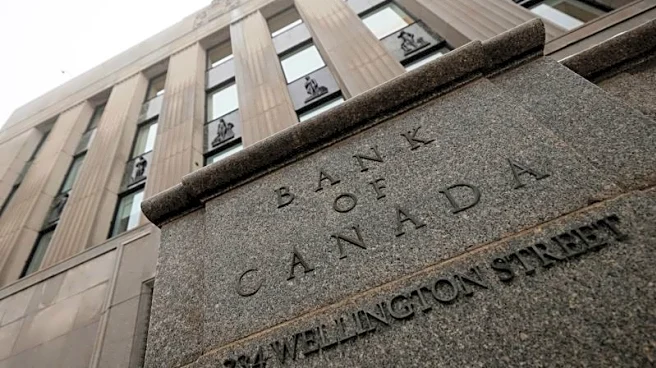By Promit Mukherjee
OTTAWA (Reuters) -Economists expect the Bank of Canada to make a second consecutive policy rate cut this week due to a slowing economy and high joblessness.
Canada's economy contracted in the second quarter by 1.6% as U.S. tariffs on Canadian imports of steel, autos and lumber eroded demand and slashed employment levels.
On Thursday, U.S. President Donald Trump suspended all trade talks with Canada.
Early estimates indicate the Canadian economy might barely avoid contracting again
in the third quarter.
A recent business and consumer survey by the BoC showed that while companies do not expect tariff-related impacts to exacerbate, they anticipate continued sluggish demand, weak order books and low hiring.
In his September monetary policy statement, Governor Tiff Macklem said the bank would be ready to cut rates again if risks to the economy rise and inflation stays under control.
CUT OF 25 BASIS POINTS SEEN
Most economists and analysts expect a rate cut due to high unemployment and slack growth in the economy.
"The output gap is sizeable with mounting evidence of labor market softness," said David Doyle, managing director and head of economics at Macquarie Group, adding that he expects a 0.25% cut.
Overseas interest rate swap markets are pricing in an 82% probability of a 25-basis-point rate cut by the BoC on October 29.
This would bring the rates down to 2.25%, or the lower end of the so-called neutral range where the economy is neither stimulating nor restricting growth.
The majority in a Reuters poll of economists forecast a 25-basis-point rate cut this week, with over 60% predicting the rate to be 2.25% at the end of next year. That would mean a long pause after the October 29 cut.
INFLATION CONCERNS
The BoC has a single mandate: to keep inflation anchored at around the midpoint of its 1% to 3% target range. However, the consumer price index in September rose more than expected to 2.3% and core-inflation measures, which exclude volatility, continue to stay above 3%.
That has prompted some economists to argue the central bank should hold rates steady.
The core inflation is not where the bank wants it to be and the economy has not fallen off a cliff, said Pedro Antunes, chief economist at Conference Board of Canada. He proposes a rate hold will help the bank retain some future firepower.
The BoC will announce its monetary policy decision on October 29 at 9:45 a.m. ET (1345 GMT). It will also release the quarterly Monetary Policy Report, including forecasts for the economy and inflation.
(Reporting by Promit MukherjeeEditing by Caroline Stauffer and Bill Berkrot)

















